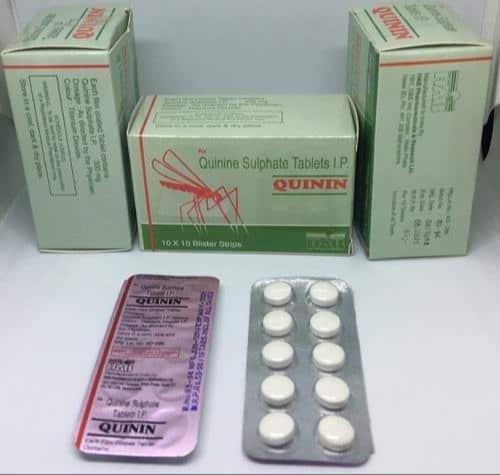White Quinine also known as Qualaquin, Qm-260, and Quinamm is a medication used to treat malaria. It belongs to a group of drugs called anti-malarial. White quinine was manufactured in capsule form and it is usually taken thrice in a day with food.
WHITE QUININE AND PREGNANCY
There is a popular belief that White Quinine may be used to prevent and abort pregnancies. How safe is this? Indeed, white quinine can cause miscarriage in the first trimester of pregnancy.
This is because when injected into the body of a pregnant woman, white quinine immediately penetrates the placenta and can seriously harm the fetus leading to miscarriage in early pregnancy. But this does not mean that the use of white quinine for abortion is appropriate. Using white quinine during pregnancy can lead to heavy bleeding, a huge negative impact on your health, or even death. If unwanted pregnancy occurs, it is best to contact the doctor and do not risk your health.
 SIDE EFFECTS OF WHITE QUININE
SIDE EFFECTS OF WHITE QUININE
Some common side effects include:
- Headache.
- Blurred Vision.
- Changes in Color Vision.
- Sweating or Flushing (Warmth, Redness, or Tingly Feeling).
- Mild Dizziness.
- Spinning Sensation.
- Ringing In the Ears.
- Upset Stomach, Vomiting, and Stomach Pain.
Other side effects may include:
- Fever, chills, body aches, and other flu symptoms.
- Easy bruising and unusual bleeding in the nose, mouth, vagina, or rectum.
- Headache with chest pain and severe dizziness.
- Fast or pounding heartbeats.
- Sudden numbness or weakness (especially on one side of the body), sudden severe headache, slurred speech, problems with balance.
- Chest pain, sudden cough, wheezing, rapid breathing, coughing up blood.
- Problems with vision or hearing.
- Pain, swelling, warmth, or redness in one or both legs.
- Severe pain in your side or lower back, blood in your urine, little or no urine.
- Low blood sugar and dark urine and clay-colored stools.
- Loss of appetite.
- Yellowing of the skin or eyes.
Do not drive or operate heavy machinery until you know how quinine affects you.
Stop taking this medicine and call your doctor at once if you have any of the side effects mentioned above. Using this medication improperly or without the advice of a doctor can result in serious side effects or death.
 DO NOT TAKE WHITE QUININE IF YOU HAVE:
DO NOT TAKE WHITE QUININE IF YOU HAVE:
- A heart rhythm disorder called Long QT syndrome.
- A genetic enzyme deficiency called glucose-6-phosphate dehydrogenase deficiency (G-6-PD).
- Myasthenia gravis.
- Inflammation of the nerves in your eyes.
- Taken quinine in the past and it caused a blood cell disorder or severe bleeding.
FOR POSITIVE EFFECTS OF WHITE QUININE, PLEASE ENSURE THAT YOU:
- Follow all directions on your prescription label.
- Do not take this medicine in larger or smaller amounts, or for longer than recommended.
- Take with food if it upsets your stomach.
- Take this medication for the full prescribed length of time. Your symptoms may get better before your condition is completely cleared.
- Tell your caregivers that you are using quinine if you need surgery or medical tests ahead of time. You may need to stop using the medicine for a short time.
- Call your doctor if your symptoms do not improve after 2 days of treatment, or if your symptoms return after you have finished the medicine.
- Store at room temperature away from moisture and heat.
- Do not use quinine to treat any condition that has not been checked by your doctor.
DRUGS THAT MAY INTERACT WITH WHITE QUININE:
Some medications can either trigger sudden health complications or slow down the effect of White Quinine. Do not withhold any information about all your medications from your doctor. Your doctor would help you figure out possible solutions in case any of those medications would interact with white quinine.
 Some of these medications include:
Some of these medications include:
- Acetazolamide
- Aminophylline
- Theophylline
- Arsenic Trioxide
- Vandetanib
- Bosentan
- Imatinib
- Methadone
- Tacrolimus
- St. John's Wort
- Some Antibiotics: Azithromycin, Clarithromycin, Erythromycin, Levofloxacin, Moxifloxacin, Pentamidine, Telithromycin, Tetracycline.
- Some Antidepressants:<span style="font-weight: 400"> Amitriptyline, Citalopram, Clomipramine, Desipramine, Nefazodone, Venlafaxine.
- Some Antifungal Medications:
Itraconazole, Ketoconazole, Posaconazole, Voriconazole.
- Some Cholesterol-Lowering Medicines:
Atorvastatin, Simvastatin, Lovastatin.
- Cough Medicines that contain Dextromethorphan.
- Heart Medications: Amiodarone, Digoxin, Dofetilide, Disopyramide, Dronedarone, Flecainide, Ibutilide, Metoprolol, Procainamide, Propafenone, Quinidine, Sotalol, Verapamil.
- Some HIV/Aids Drugs: Atazanavir, Delavirdine, Efavirenz, Fosamprenavir, Indinavir, Nelfinavir, Nevirapine, Ritonavir, Saquinavi.
- Some Medicines Used To Prevent Or Treat Nausea And Vomiting: Dolasetron, Droperidol, and Ondansetron.
- Some Medications Used To Treat A Psychiatric Disorder: Chlorpromazine, Clozapine, Haloperidol, Mesoridazine, Pimozide, Thioridazine, and Ziprasidone.
- Some Seizure Suppositories: Carbamazepine, Fosphenytoin, Oxcarbazepine, Phenobarbital, Phenytoin, Primidone.
- Some Stomach Acid Reducers:
Cimetidine, Ranitidine
- And some Tuberculosis Medication: Rifabutin, Rifampin and Rifapentine.
Always ensure you confirm the drug interactions of any medication before usage.


 SIDE EFFECTS OF WHITE QUININE
SIDE EFFECTS OF WHITE QUININE DO NOT TAKE WHITE QUININE IF YOU HAVE:
DO NOT TAKE WHITE QUININE IF YOU HAVE: Some of these medications include:
Some of these medications include: